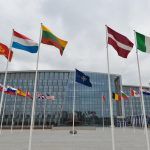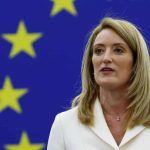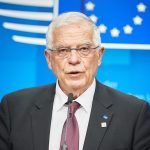Check against delivery!
Good morning, dear Mr Chairman, dear Members of the Committee, dear Members of the European Parliament attending this debate,
We are witnessing how Russia’s assault on Ukraine continues, and this assault painfully highlights why we need to pay more attention to foreign interference, and in particular to foreign disinformation and information manipulation. This poses a clear threat to our democracy, to our stability, to our security – and we need to address it. So, I therefore very much welcome your report and the work of the Special Committee on Foreign Interference.
Information manipulation and interferences is something that the Russian propaganda machine is actively using to accompany Russia’s military campaign in Ukraine, spreading false information among their own population about why this invasion has taken place and what is the situation in Ukraine.
Over the last weeks, much before the invasion started, the Kremlin’s outlets were preparing the ground, by reversing the cause and consequences of this aggression and portraying Russia and the Russian people as a kind of victim: “Genocide”; “[The President of Ukraine, Volodymyr] Zelensky is committing genocide. Zelensky is a criminal, is a puppet in the hands of the Western people, and when they come to Kyiv, they will do a second Nuremberg, in order to clean Ukraine of the Nazis who are committing genocide against Russian people”. This is the kind of things that they are systematically spreading. Undermining the legitimacy of the democratically elected Ukrainian Government, presenting them as the result of a “coup d’Etat”, who came to power not through elections but through a “coup d’Etat”: “he is a criminal, a war criminal, he is a Nazi, he is a dictator”. And also distorting historical facts. Well, history can be interpreted in very different ways, but to consider that Zelensky is a war criminal and Nazi who is committing genocide against the Russian people is not a matter of historial interpretation.
The Kremlin and its outlets are systematically lying about the situation, about the military situation and about the suffering of the Ukrainian population. They claim systematically that the Ukrainian authorities are bombing their own citizens or provoking nuclear incidents in order to blame Russia. Systematically, these kind of news are being spread. Also, the alleged “Russo-phobia” that the state-affiliated media report on is another thing that people in Russia listen to. Let me say once again, our measures are against the Russian leadership, not against the Russian people, and the current situation is a result of President [Vladimir] Putin’s actions. And if he wants, he can solve it by just stopping the war.
The state media and “the ecosystem” around them are being used as instruments to push these narratives, to manipulate and to mislead. And they are an integral part of the aggression – it not just bombing houses, infrastructure, the bodies of the people; they are bombing their minds, they are bombing their spirits. The Russian leadership is cracking down on independent media, on civil society, has banned Twitter, has banned Facebook and a number of foreign media to be able to operate in Russia. The Kremlin has introduced a law criminalising what they call “fake” information about the war in Ukraine. It can cost you 15 years in jail, targeting also international journalists who are doing their vital work in Russia. As a consequence, they deprive the Russian citizens of any access to independent media, to independent information about what is happening in Ukraine and how the Russian armed forces are behaving.
So Russia is moving towards a complete isolation of its citizens from information coming from the outside world. They are putting them in a bubble, isolating them in order to not allow them to know what is happening.
The international community has come together in response to President [of Russia, Vladimir] Putin’s senseless war in a coordinated and decisive manner. And, I am proud to see that the European Union has been able to show its capacity to deliver in this field also.
We have been able to do this because we are not working from scratch. It comes from 2015. When leaders of the European Union recognised the threat of foreign information and misinformation coming from Russia – in 2015, it is seven years ago. Then they tasked the High Representative to address this challenge. We created, in the European External Action Service, teams of people, with the capacities and expertise that has been developed in the last seven years, allowing us to take today decisive steps to tackle this issue.
We have built a strong Stratcom Team, which is doing, I think, an excellent work. You will judge it. It has been praised in your reports. Thank you for that. We have been strengthening our proactive public communication to provide factual information, not least through our EUvsDisinfo(link is external) website, which exposes the Kremlin narratives. Go to this website, use our EUvsDisinfo(link is external) website and you will find there registered hundreds of disinformation cases in European countries: Germany and the United Kingdom, in France, in Italy and Spain. Targeting a variety of issues like elections, vaccines, about Brexit, or about the secessionist movements in some European [Union] Member States.
We have increased our cooperation with partners like NATO and the G7 to understand how the Kremlin destabilises and manipulates the information, weakening Ukraine and our Western resolve. We have a Rapid Alert System that has proven its importance, allowing to swiftly share with EU institutions – with my colleagues from the European Commission with whom we are working closely and positively – EU Member States and also partners. Sharing analysis and debunking material. I insist, please, inform about the existence of this website, where hundreds of disinformation cases can be found.
We have intensified our work to help our partners in the region to tackle the issue of interference and information manipulation – especially in the Western Balkans, which are currently being targeted systematically by these campaigns.
Most importantly, we have imposed costs on the perpetrators, including through banning Russia Today and Sputnik from broadcasting in the European Union. Because they are not independent media; they are assets, they are weapons in the Kremlin’s manipulation ecosystem.
I want to stop here because there have been criticisms saying that we are attempting against the freedom of information. Let us consider what is information and what these outlets are. Let me take a moment to underline the essence of this issue. We are not trying to decide what is true and what is false. I am not the Minister of Truth; we do not have Ministers of Truth. What we have to focus on are foreign actors, who intentionally, in a coordinated manner, try to manipulate our information environment to advance their own purposes and to harm us.
Allow me to say this in Spanish.
La democracia es un sistema que funciona en base a la información. La información es el combustible de la democracia. Los ciudadanos actúan como ciudadanos en base a la información que reciben. En base a lo que saben, como interpretan la realidad, juzgan a sus gobernantes y deciden su voto. La democracia es un sistema cuyo combustible es la información. Si la información es mala, la democracia es mala. Si la información está sistemáticamente sesgada y contaminada por la mentira, los ciudadanos no pueden tener cabal conocimiento de la realidad y su juicio político está sesgado.
Por eso tenemos que defender que la información sea un bien protegido. Cuando usted va a comprar carne en un supermercado, tiene garantías sobre la calidad de ese producto, para evitar que consumirlo le produzca una enfermedad. Tiene que haber también alguna clase de garantía para que la información no sea un elemento que contamine las mentes.
La democracia funciona con la información y, por eso, Rusia ha creado Sputnik. Sputnik no es un inocente medio que tiene una determinada visión de la realidad.
Sputnik is not a media that understands things in a certain way. Sputnik was created by a Russian Presidential decree, with the aim to report on the state policy of Russia abroad. And according to Russia Today’s editor-in-chief, Russia Today is capable of conducting an information war against the whole Western world. Both channels [Sputnik and Russia Today] facilitate and engage in cyber-facilitated influence operations, including those that have been attributed to the Russian Military Intelligence, the famous GRU.
To be able to respond equally in a quick and decisive manner in the future, I will propose a new mechanism that will allow us to sanction those malign disinformation actors. This will be part of a broader toolbox that we are currently working on, to further enhance our capacity to act. This toolbox will be structured across four cross-cutting dimensions, improving our situational awareness. First, to build up our resilience and those of our partners, by stepping up our support to independent media and civil society in third countries and boosting the strategic communication capacities of our Delegations. Being that a tool of foreign policy I am always talking about third countries, as it is my colleagues from the Commission who are working inside European Union territories. But there is a lot of work to do in order to support our partners around the world.
Second, to ensure disruption of such malign activities and regulatory responses to them – the Code of Practice and the Digital Services Act, on which Vice-President [for Values and Transparency, Věra] Jourová will say more, are crucial elements in this regard.
I am not going to go deeper on this Code of Practice and Digital Services because Vice-President [for Values and Transparency, Věra] Jourová knows more than I about it.
And, last but not least, a continuous diplomatic response and instruments within the Common Foreign and Security Policy. Within our foreign policy we have to introduce the concept of information battles. Since the beginning of the pandemic, I coined the sentence “battle of narratives”. This battle of narratives is every day more important. Look at what is happening in Africa, what do you think? People are influenced by what they are being told. And at the end it goes up to the political scale and finally it converts in votes in the international institutions.
This brings me to the report by the INGE Committee, which I welcome so much. This report shows appreciation of the work that my service has been doing and constantly expanded on since we received this mandate by the [European] Council in 2015. I want to assure you that we take your recommendations very much into account, including your proposal for new structures to make our work even more efficient and sustainable.
I thank you a lot for your support. You have been very supportive of our strategic communication teams devoted to the Balkans, devoted to the Eastern border and how unhappily they are so much in the news.
Thank you for your support. We work together. This is a critical battle for democracy. Once again, allow me to say, democracy is a system that works on the basis of the information that a citizen has. That is why we have to protect the freedom of information and fight against disinformation.
Link to the video (starting as of 11:15): https://audiovisual.ec.europa.eu/en/video/I-219157






Leave a Reply